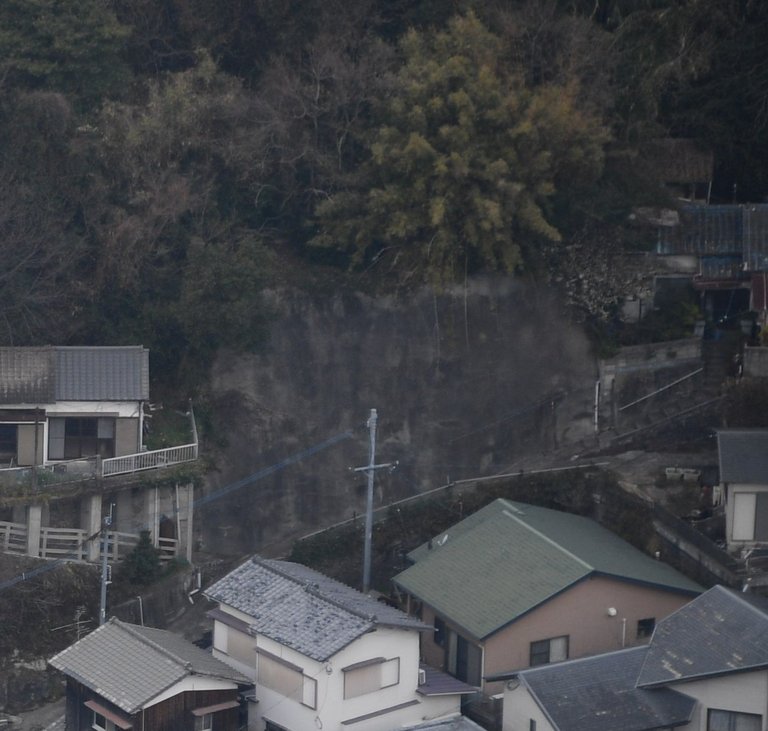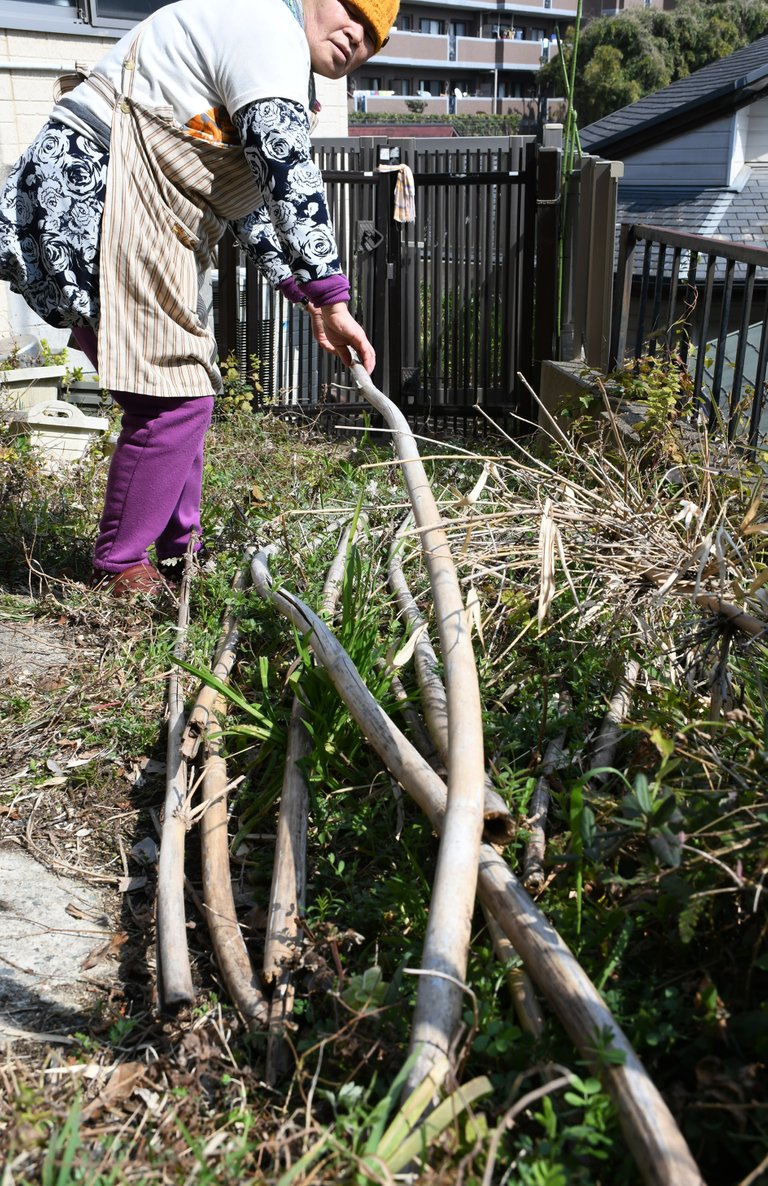Bamboo Forest Encroaching on the Neighborhood: The Dilemma of the Impoverished 80-year-old Heir
-May 4, 2018
"Bamboo stalks are falling down from the cliff behind my house. It's so bad that I even feel that my life is in danger, but no one is taking notice." This plea for help was sent to the Special Mission News Crew by Ms. Nakajima (aged 67), who lives in Fukuoka City. We indeed felt the danger of the situation upon visiting the location. However, our investigation led us to the dilemma of land ownership, of not being allowed to abandon a property even if one wanted to.
According to Ms. Nakajima, it all began during a typhoon on a summer day in 2016. She discovered that a bamboo stalk about 7 meters long had dropped into her yard, and its branches were scattered over her roof as well. Since then, more bamboo stalks have been falling onto her property on days when the wind is strong.
Once, she found a bamboo stalk stuck right in her roof drain pipe when she stepped out to hang out her laundry in her yard. But it was not until last November that she became truly frightened about the situation; a bamboo stalk snapped and fell from above while she was cleaning her yard. "It was like some weapon," she says as she recollects the thump she heard that day. Even now, about 20 stalks around 5 meters long are stacked in a heap in front of her home.
Ms. Nakajima initially sought help from the local government. For the first 3 times, the fire department personnel came to cut bamboo, but they did not come for the 4th time. "Our response was a mistake. The government should not have intervened because it is a privately-owned property," said an official at the Nishi Ward Office. As timber can be a resource, the employee said apologetically that they "should have responded more carefully."

The green roof is Ms. Nakajima’s house. The bamboo stretches out from above the cliff behind. Location: Fukuoka (photographed from a helicopter).
We flew over the land in question with our helicopter to confirm the situation. Homes are built right up to the slope of the dense thicket of trees. Bamboo stalks were left to grow freely and were spilling over sideways. It looked as though they are about to jump over to Ms. Nakajima's house that stands on the other side of a narrow path.
■ □
The owner of the bamboo-covered land is a woman in her 80s who also lives in the same ward. When we finally located her home and went to visit her, she told us, "I have lost track of how much I've already spent on that piece of land. I just don't have any more money." She showed us a wad of receipts for constructions, surveys, and so forth.
The woman says that she received the land as an inheritance from her deceased husband in 1970. She had requested real estate agencies and the Nishi Ward Office to take ownership but was turned down because "they had no use" for it.
The slope crumbled in 2001. The city and fire department removed the debris, but she was informed that safety management was her responsibility. The fee to spray concrete on the hillside was 3,675,000 yen, which she paid for by taking out loans from relatives, among others.
Then the bamboo had begun to fall. The Nishi Ward Office, having received complaints from the neighborhood, sent her a document urging her to deal with the situation. She says that her mind blanked out when she realized that someone could die if an accident occurred.
The problem is that she has weak legs and cannot possibly cut down the bamboo on her own. Neither can she afford to hire a company on her pension. "I've already given up. If something happens, just throw me into jail." Her eyes teared up as she spoke.
□ ■
The Fukuoka City Finance Bureau says that the city can only accept a transfer of property if it can be utilized.
But is land truly something that one cannot relinquish? Professor Katsumi Yoshida of Waseda Law School informed us that the Japanese Civil Code does not stipulate whether it is possible to abandon land ownership. A clause states that "Ownership of real estate without an owner shall vest in the National Treasury," but Yoshida explains that it is generally not permitted to abandon a property that is a financial burden to maintain.
In a trial seeking registration of the transfer of ownership with the purpose of renunciation of land inheritance, the Matsue District Court determined in May 2016 that it is contrary to society's ethical sense to force the state to bear the burden and responsibility for a property, thereby invalidating the right to abandon land ownership. The Matsue Branch of the Hiroshima High Court held up this decision as well.

Bamboo stalks that fell onto Ms. Nakajima’s property. “I throw away small branches in garbage bags, but I can’t dispose longer stalks on my own,” she sighed. Location: Fukuoka.
On the other hand, a non-profit organization in Fukuoka that assists with inheritances says that consultation requests from people who seek to relinquish their properties have been increasing this past year. "Mountains and forests are particularly in dire conditions because there are no practical ways to utilize them. This government policy must cause some people not to register their land to avoid being with management fees. Consequently, this results in the owner-less properties," he analyzes.
Is there no solution to this problem? Professor Yoshida points out that, from the perspective of national land conservation, the state and municipals must take on these properties and consider ways to utilize them. "A framework is necessary to establish a baseline and receive transfers of land ownership, as a strategy to prevent regional deterioration," he states.
近隣襲う竹林…管理限界 相続の80代、資金が底 放棄は法で認められず
「家の裏の崖から竹が落ちてくるんですよ。命の危険すら感じます。でも誰も取り合ってくれなくて」。福岡市西区の女性(67)から、特命取材班にSOSが寄せられた。現場では確かに危険を感じた。ただ、取材を進めると「手放したくても手放せない」、土地所有権の問題に行き着いた。
女性によると、それは、台風に見舞われた2016年の夏の日のこと。庭先に長さ7メートルほどの竹が落ちていた。屋根の上にも枝が散乱。以来、風が強いと竹が落ちてくるようになったという。
洗濯物を干しに庭に出ると、雨どいにすっぽりはまっていたこともあった。恐怖を覚えたのは昨年11月。庭を掃除していると背後でストン、と音がした。「凶器みたいでしたよ」。折れて落ちてきた竹だった。自宅前には今も5メートルほどの竹が約20本積み上がる。
当初、行政に助けを求めた。消防署の職員が3回、竹を切りに足を運んでくれたが4度目はなかった。西区役所の職員は「間違った対応だった。個人所有の土地なので行政が介入するべきではなかった」。樹木は財産にもなり得るため「慎重に対応しなければならなかった」と申し訳なさそうに話した。

緑の屋根が67歳の女性宅。裏の崖の上から竹が張り出すように生えていた=福岡(ヘリから撮影)
取材用のヘリで上空から確認した。木々がこんもり茂る斜面のすぐそばに住宅が張り付いている。伸び放題であふれ返った竹が横に張り出し、小道を挟んだ女性宅に飛びかかろうとしているように見えた。
■ □
竹が生い茂る土地の持ち主は同区の80代の女性。ようやく捜し当てた女性の自宅を訪ねると「あの土地にいくら使ったか。もう、お金はないです」。工事や測量…。束になった領収書を見せてくれた。
女性によると、問題の土地は亡き夫から1970年に相続。引き取ってもらえないか不動産業者や西区役所に頼んだが「使い道がない」と断られたという。
2001年に斜面が崩れた。市や消防が土砂を撤去してくれたが、安全管理は自己負担と言われた。コンクリートの吹き付け工事にかかった費用は367万5千円。親戚などから借金して支払った。
今度は竹が落ちるようになる。近隣の苦情を受けた西区役所から対応を促す書類が届いたときには「事故が起きたら誰かを殺してしまうかもしれない」と頭が真っ白になったという。
足が悪く、とても自分で処分はできない。年金生活で業者を雇う余裕もない。「もう諦めました。事故があったら刑務所にでも入れてください」。女性は目に涙を浮かべていた。
□ ■
福岡市財務局によると、市が譲渡を受けるのは「使い道がある場合」に限られる。16年度に寄付を受けた土地は道路用地154件、農業用のため池1件。山林は難しそうだ。
そもそも「土地」は手放せないものなのか。早稲田大大学院法務研究科の吉田克己教授(民法)に尋ねると、土地所有権の放棄が可能か否かは民法にも規定がない。「所有者のない不動産は、国庫に帰属する」という条文はあるが、今回のように管理に負担がかかる土地の放棄は一般的には認められないという。
土地の相続放棄を目的に国に所有権移転登記を求めた裁判では松江地裁が一昨年5月、「土地の負担、責任を国に押し付けるもので社会の倫理観念に反する」とし、所有権放棄は無効と判断。広島高裁松江支部もこれを支持している。
一方、NPO法人相続・遺言サポートセンター(福岡県)によると、土地を手放したいという相談はこの1年で増加中。「山林は使い道がないので特に深刻。管理負担を避けるため登記をせず、所有者不明の土地を生む原因にもなっているはずだ」と分析する。

落ちてきた竹。「小さい枝ならごみ袋に入れて捨てるが、長いものは処理しきれません」とため息をついた=福岡市
解決策はないのか-。吉田教授は、国土保全の観点からも国や市町村を受け皿にして活用方法を模索する必要があると指摘。「地域の荒廃を防ぐためにも、一定の基準を設け政策として引き受ける仕組みが必要ではないか」と話した。
=2018/05/04付 西日本新聞朝刊=
what a dire situation. Does it mean the country doesn't take care of ownerless properties at all? "that it is contrary to society's ethical sense to force the state to bear the burden and responsibility for a property, thereby invalidating the right to abandon land ownership." well, isn't taking care of its land and the people within the nation the very task of a nation?